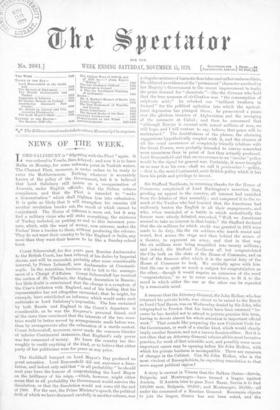The Guildhall banquet on Lord Mayor's Day produced no great
sensation. Lord Beaconsfield did not announce a disso- lution, and indeed only said that "in all probability" he should next year have the honour of congratulating the Lord Mayor on the brilliancy of his reign, —which, however, might either mean that in all probability the Government would survive the dissolution, or that the dissolution would not come till the end of 1880. For the rest, the Prime Minister's speech, the political drift of which we have discussed carefully in another column, was a singular mixture of fantastic flourishes and rather ominous hints. He adduced as evidence of the " permanent " character ascribed by her Majesty's Government to the recent improvement in trade, the great demand for "chemicals "—like the German who held that the true measure of civilisation was "the consumption of sulphuric acid ;" be rebuked our "brilliant brethren in Ireland" for the political agitation into which the agricul- tural depression has plunged them ; he pronounced a man over the glorious invasion of Afghanistan and the avenging of the massacre at Cabul ; and then he announced that "although Europe is covered with armed millions of men, we still hope, and 1 will venture to say, believe, that peace will be maintained." The doubtfulness of the phrase, the alarming suggestions hypothetically coupled with it, and the absence of all the usual assurances of completely friendly relations with the Great Powers, were probably intended to convey somewhat more uneasiness than in point of fact they actually produced. Lord Beaconsfield said that our recurrence to an " insular " policy would be the signal for general war. Certainly, it never brought us so near it as his own—shall we call it peninsular ?—policy, --that is, the semi-Continental, semi-British policy which it has been his pride and privilege to invent.


































